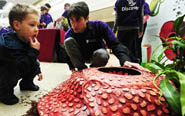This is the third consecutive public engagement grant in two years to have been awarded to academics from the School of Biological Sciences for projects carried out in collaboration with Botanic Garden staff.
The most recent BBSRC award will be used to fund a festival at the University’s Botanic Garden over the August Bank Holiday weekend. The event, which will be co-ordinated by Botanic Garden Director Professor Simon Hiscock, Curator Nicholas Wray and Dr Heather Whitney of the School of Biological Sciences, aims to raise awareness and understanding of the critical role bees and other animals play in pollination and the importance of pollination for food production. It will also highlight the dramatic decline in bee and pollinator populations in recent years. The event will engage with local bee keepers, orchard fruit growers, farmers and cider producers as well as a wide audience of the general public. More details about the event will appear on the University news website nearer the time.
The award follows hot on the heels of a grant worth £1,766 from Research Councils UK (RCUK) to Professor Simon Hiscock. The award funded the ‘Savage Garden’, a display of carnivorous and parasitic plants that formed one of the highlights of Discover, the University’s biennial public celebration of research. Discover took place in the The Mall Bristol, Broadmead, and Cabot Circus last weekend. The event formed part of the University’s contribution to National Science and Engineering Week and was co-ordinated by the Centre for Public Engagement (CPE).
Savage Garden featured a display of living plants from the Botanic Garden mixed with papier-mâché models of rare carnivorous and parasitic plants, including a life-sized Rafflesia – the largest flower on Earth – made by Dr Chris Thorogood from the School of Biological Sciences. Other models included the giant rat-eating pitcher plant Nepenthes raja from Borneo. Using a combination of models and live plants, staff and students gave interactive tutorials on the biology of the plants to visiting school groups and members of the public. The live plants – Venus fly traps and various other pitcher plants – will become permanent fixtures in the Botanic Garden to be used for educational purposes.
Nicholas Wray, Curator of the Botanic Garden, who advised on the plant displays, said: ‘Savage Garden was a huge success and we are planning a follow-on event for schoolchildren at the Botanic Garden later in the year. In addition, the live plants will enhance the garden’s role as a regional teaching resource, adding longevity to its outreach activities.’
Last year, a group from Biological Sciences and the Botanic Garden (including Professors Keith Edwards and Simon Hiscock and Nicholas Wray) was awarded £4,906 by the BBSRC for a project celebrating Darwin’s work as a botanist to coincide with the bicentenary of the great naturalist’s birth. A series of events between June and September 2009 brought Darwin’s work to life for a wide audience, and included:
- an interactive interpretive display of ‘Darwin the Botanist’ highlighting key plants studied by Darwin in the course of his revolutionary work (the display was originally designed for the Bristol Festival of Nature from 5-7 June and was such a success – it was attended by around 25,000 people – that it was established as a permanent display at the Botanic Garden);
- scientist-led tours of the Botanic Garden, ‘Voyages of Discovery’ and ‘Darwin the Botanist’, for the public and school groups, which also catered for Deaf audiences;
- ‘ science picnics’ led by scientists from the School of Biological Sciences on floral adaptations to pollination, artificial selection and plant breeding, and bat pollination. These were also accessible by Deaf audiences.
All of the events proved extremely popular and were well attended by both hearing and Deaf audiences.
Professor Hiscock said: ‘The Botanic Garden’s recent success in obtaining three prestigious public engagement grants in collaboration with staff in Biological Sciences highlights the importance of the Garden as a vehicle for delivering Bristol’s vision of an “engaged University”. We now intend to work closely with CPE to extend our portfolio of engagement and outreach activities beyond just the botanical and biological.’
